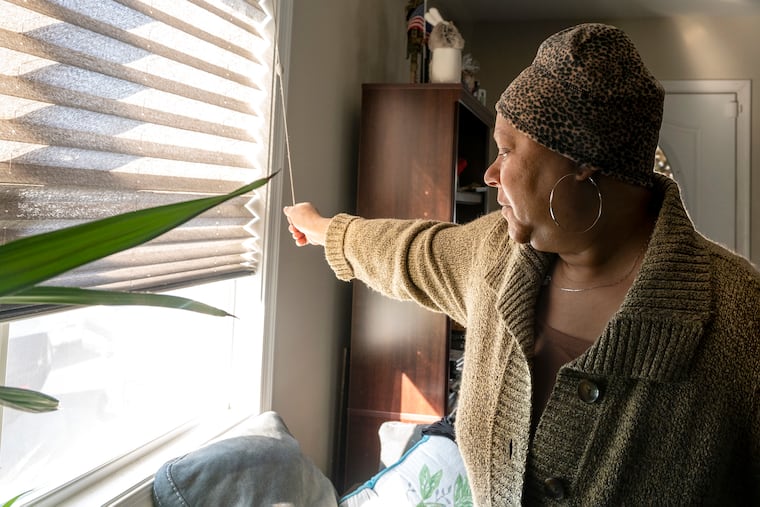Penn started giving cancer patients free rides to appointments. It helped reduce no-shows and increase clinical trial enrollment.
Through a partnership with Ride Health, the cancer center provides hundreds of free rides every year.

Vanessa Brown held her breath and squeezed her eyes shut as she braced herself for the incision along the right side of her chest.
Before inserting a chemotherapy port, breast cancer patients typically receive anesthesia or another sedation medication that leaves them too woozy to drive themselves home and requires they have a prearranged ride. Brown’s son, an exterminator, had already missed so much work taking her to appointments that his boss was threatening to fire him.
Rather than miss the appointment, Brown decided to forgo sedation and have the procedure with just a local anesthetic. “They told me I did an excellent job. I said, ‘Well, I had to. I had no choice,’” the 66-year-old retired nurse from Bristol recalled.
University of Pennsylvania’s Abramson Cancer Center is attempting to address one of the most common challenges cancer patients face: Lack of transportation to critically important appointments. Now in its fifth year, the cancer center’s transportation program provides free rides to hundreds of cancer patients and has recently expanded to include certain cancer screening appointments, such as colonoscopies and mammograms.
The program is part of a community outreach initiative to address barriers to care. Organizers say it has helped reduce appointment no-shows and enabled more patients to enroll in clinical trials that require repeat visits to medical clinics. Just 2% of Abramson’s hematology oncology patients missed their appointments between July and November of this year — dramatically lower than the double-digit no-show rates that are common among cancer centers. And 24% of Abramson patients were enrolled in a clinical trial in 2021, up from 12% five years earlier.
The gains can’t entirely be attributed to the transportation program. But in an interview with The Inquirer, Abramson Director Robert Vonderheide cited the program as a critical component in the cancer center’s strategy for improving access to treatment and clinical trials, especially among Black and Latino patients, who experience higher rates of missed appointments and who are underrepresented in clinical trials.
“These things sometimes don’t sound so breakthrough, compared to a new cell or gene therapy,” he said. “But imagine if we solved the transportation barrier for patients.”
Transportation is a common barrier to care
Penn launched its rideshare program in 2017 through a pilot with Ride Health, a New York-based health-care company founded by Penn graduate Imran Cronk.
As an undergraduate studying hospital administration, Cronk volunteered in a North Carolina hospital, helping patients navigate the emergency department. Late one night, he met an elderly patient who had been discharged but had no one to pick him up and no money to pay for a cab or bus ride home. Cronk decided to drive him.
“It got me thinking how often this must happen,” he recalled.
About 5% of people nationwide have missed medical care in the last year because they didn’t have transportation, according to a nationally representative health-care survey of 9,000 adults by the Urban Institute, a nonprofit research organization.
Black and Hispanic patients, as well as those with lower incomes, were most likely to miss medical appointments due to lack of transportation, according to the study. Twenty-one percent of people who didn’t have a car and lived in a neighborhood with limited public transit said they’d missed an appointment in the last year because they had no way to get there.
Transportation is one of the primary issues that cancer patients encounter, said Heather Sheaffer, director of patient and family services at Abramson. Many have treatment plans calling for lots of appointments and often are not allowed to drive themselves home because of the medications they receive.
“People are so stressed out and feel a lack of control of what’s happening in their lives when they’re diagnosed with cancer,” she said. “This is one thing we can say: ‘Your ride fell apart? We’ll fix it. You’re not going to miss your appointment.’”
How Penn’s Ride Health partnership works
Before patients begin treatment at Abramson, they’re assigned a social worker or case manager who talks to them about the logistics of their care, including how they will get to their appointments. Patients who don’t have reliable transportation are eligible for the rideshare program.
Case managers use an online portal to request the type of ride their patient needs. Ride Health partners with Uber and Lyft, as well as medical vans and private ambulances when needed.
In a typical month, Penn schedules about 150 rides a month for patients getting treatment at Abramson’s main location and satellite offices in Valley Forge, Radnor, and Cherry Hill.
Free rides for cancer screening
Earlier this year, Penn expanded the effort to include patients who need a lift to get preventive cancer screenings, such as colonoscopies and mammograms.
Carmen Guerra, a Penn professor of medicine who specializes in cancer health equity, said that improving screening rates and diagnosing cancer earlier could reduce overall treatment costs for patients. The initiative could save money for health systems, too, if the cost of rides to screening exams is less than the cost of missed cancer treatment appointments.
“It makes so much sense to invest in helping patients access a $15 ride to get a potentially lifesaving test, rather than waiting until they end up in the ER,” she said.
To patients like Brown, the program has been “a godsend.” She no longer worries whether getting the care she needs will mean risking her son’s job or grimacing through an uncomfortable procedure.
Over the last two years, Brown has called on Ride Health nearly a dozen times.
When it’s time for her next appointment, she knows a car will be outside waiting for her.